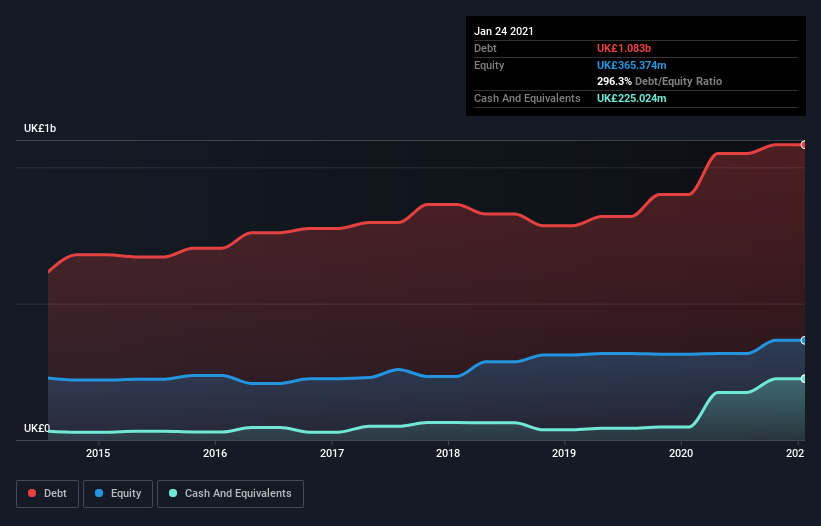Warren Buffett famously said, 'Volatility is far from synonymous with risk.' So it might be obvious that you need to consider debt, when you think about how risky any given stock is, because too much debt can sink a company. As with many other companies J D Wetherspoon plc (LON:JDW) makes use of debt. But should shareholders be worried about its use of debt?
Why Does Debt Bring Risk?
Debt and other liabilities become risky for a business when it cannot easily fulfill those obligations, either with free cash flow or by raising capital at an attractive price. Ultimately, if the company can't fulfill its legal obligations to repay debt, shareholders could walk away with nothing. However, a more usual (but still expensive) situation is where a company must dilute shareholders at a cheap share price simply to get debt under control. By replacing dilution, though, debt can be an extremely good tool for businesses that need capital to invest in growth at high rates of return. When we think about a company's use of debt, we first look at cash and debt together.
See our latest analysis for J D Wetherspoon
What Is J D Wetherspoon's Debt?
As you can see below, at the end of January 2021, J D Wetherspoon had UK£1.08b of debt, up from UK£900.6m a year ago. Click the image for more detail. However, it also had UK£225.0m in cash, and so its net debt is UK£857.7m.

How Strong Is J D Wetherspoon's Balance Sheet?
We can see from the most recent balance sheet that J D Wetherspoon had liabilities of UK£267.6m falling due within a year, and liabilities of UK£1.63b due beyond that. Offsetting this, it had UK£225.0m in cash and UK£1.46m in receivables that were due within 12 months. So it has liabilities totalling UK£1.67b more than its cash and near-term receivables, combined.
Given this deficit is actually higher than the company's market capitalization of UK£1.41b, we think shareholders really should watch J D Wetherspoon's debt levels, like a parent watching their child ride a bike for the first time. In the scenario where the company had to clean up its balance sheet quickly, it seems likely shareholders would suffer extensive dilution. When analysing debt levels, the balance sheet is the obvious place to start. But it is future earnings, more than anything, that will determine J D Wetherspoon's ability to maintain a healthy balance sheet going forward. So if you want to see what the professionals think, you might find this free report on analyst profit forecasts to be interesting.
In the last year J D Wetherspoon had a loss before interest and tax, and actually shrunk its revenue by 59%, to UK£760m. That makes us nervous, to say the least.
Caveat Emptor
Not only did J D Wetherspoon's revenue slip over the last twelve months, but it also produced negative earnings before interest and tax (EBIT). To be specific the EBIT loss came in at UK£81m. When we look at that alongside the significant liabilities, we're not particularly confident about the company. It would need to improve its operations quickly for us to be interested in it. Not least because it had negative free cash flow of UK£202m over the last twelve months. So suffice it to say we consider the stock to be risky. The balance sheet is clearly the area to focus on when you are analysing debt. But ultimately, every company can contain risks that exist outside of the balance sheet. For instance, we've identified 1 warning sign for J D Wetherspoon that you should be aware of.
At the end of the day, it's often better to focus on companies that are free from net debt. You can access our special list of such companies (all with a track record of profit growth). It's free.
If you’re looking to trade J D Wetherspoon, open an account with the lowest-cost* platform trusted by professionals, Interactive Brokers. Their clients from over 200 countries and territories trade stocks, options, futures, forex, bonds and funds worldwide from a single integrated account. Promoted
New: Manage All Your Stock Portfolios in One Place
We've created the ultimate portfolio companion for stock investors, and it's free.
• Connect an unlimited number of Portfolios and see your total in one currency
• Be alerted to new Warning Signs or Risks via email or mobile
• Track the Fair Value of your stocks
This article by Simply Wall St is general in nature. It does not constitute a recommendation to buy or sell any stock, and does not take account of your objectives, or your financial situation. We aim to bring you long-term focused analysis driven by fundamental data. Note that our analysis may not factor in the latest price-sensitive company announcements or qualitative material. Simply Wall St has no position in any stocks mentioned.
*Interactive Brokers Rated Lowest Cost Broker by StockBrokers.com Annual Online Review 2020
Have feedback on this article? Concerned about the content? Get in touch with us directly. Alternatively, email editorial-team (at) simplywallst.com.
About LSE:JDW
J D Wetherspoon
Owns and operates pubs and hotels in the United Kingdom and the Republic of Ireland.
Good value with proven track record.
Similar Companies
Market Insights
Community Narratives



